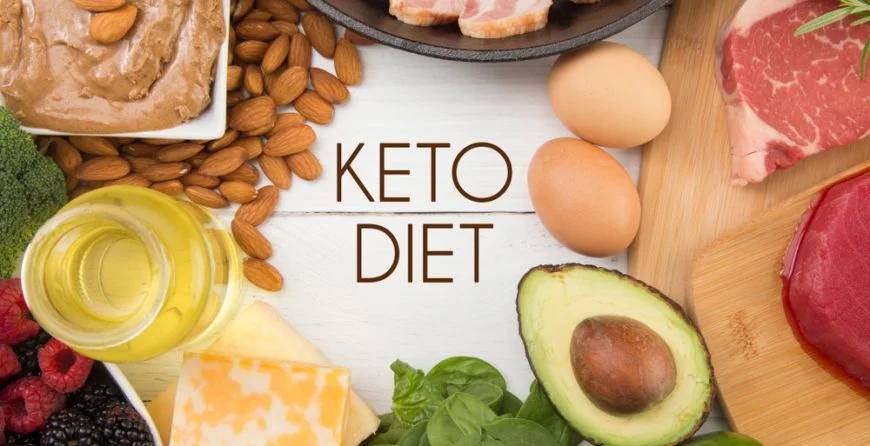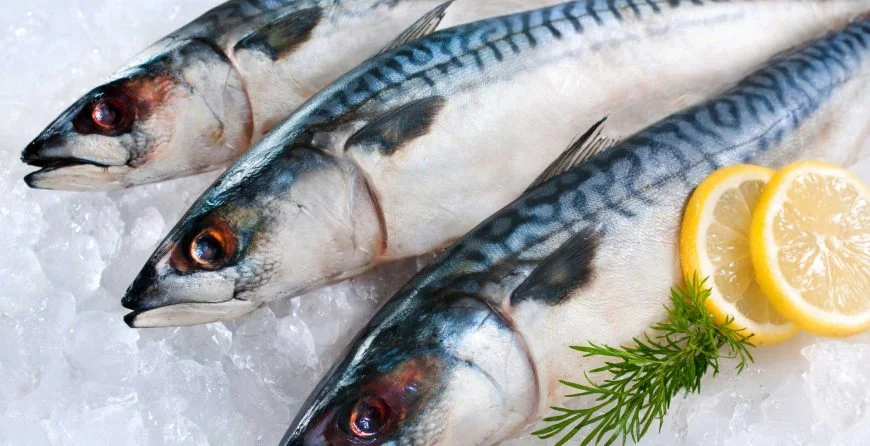What you Want, Find Here ↓
ToggleWhat does Keto mean?
What is keto?
To clarify the cliche “what is keto or keto diet what is it” here is the definition of the term “keto” which is short for “ketogenic” describes a low-carb but high-protein diet. It requires significantly lowering carbohydrate intake and substituting fat for it. The basic rules of the ketogenic diet are that it should contain the highest consumption of fats and normal consumption of protein around 30-35% and as minimum as possible intake of carbohydrates each day.
What is Ketosis?
When your body doesn’t have enough carbohydrates to burn for energy, a process known as ketosis takes place. Ketosis burns fat to produce something called ketones that it can utilize as fuel. You might enter ketosis more quickly if you practice intermittent fasting. There are many other ways to fast from time to time, but the most popular one entails eating just for around eight hours a day and fasting for the other sixteen. Using a blood ketone meter to measure your ketones is the fastest and most reliable approach to determine whether you are in ketosis. Once your blood ketone levels reach 0.5 mmol/L or above, you are in ketosis.
What are Keto Foods?
The most asked query of this diet is what are keto foods? The answer lies in animal proteins, Dairy and dairy alternatives, Vegetables, Fats and oils, beverages, and much more.
What is a Ketogenic Diet?
I am text block. Click edit button to change this text. Lorem ipsum dolor sit amet, consectetur adipiscing elit. Ut elit tellus, luctus nec ullamcorper mattis, pulvinar dapibus leo.
What are the basics of the keto diet?
The body begins to burn fat for energy when carbohydrate intake is sufficiently low. The liver changes the stored body fat into molecules called ketones. This is how the diet’s name came to be. 7 basics of the ketogenic diet people must know to speed up their weight loss are:
- Limit carbs to 50 grams per day.
- Eat a lot of healthy fats.
- Try to take non-starchy veggies.
- Consume protein in moderation.
- Try keto intermittent fasting.
- Make ahead meal plans.
- Know how to cope with “Keto Flu”.
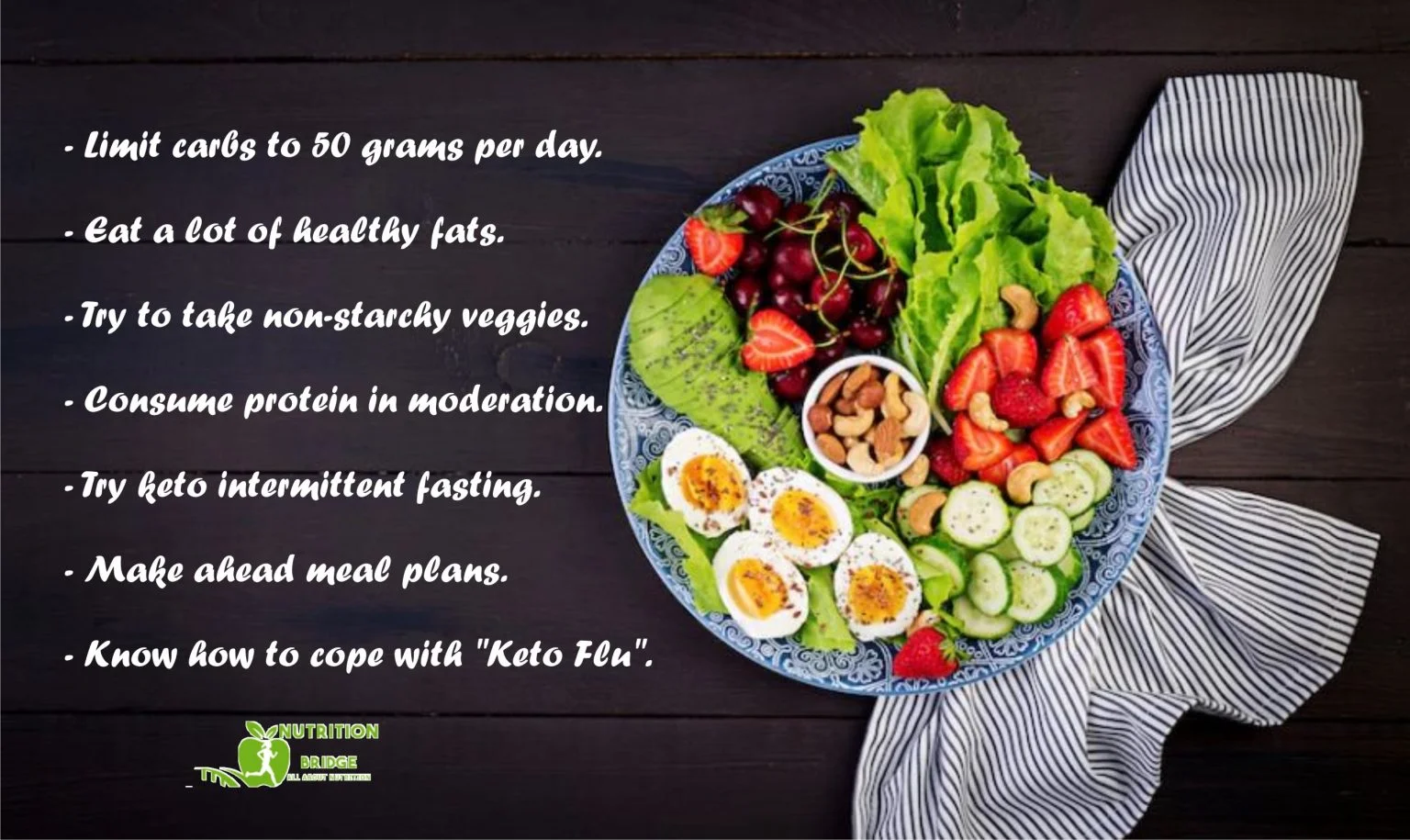
What are the Different Types of Ketogenic Diet?
Different types of ketogenic diets are:
- Standard ketogenic diet (SKD)
- Cyclical ketogenic diet (CKD)
- Targeted ketogenic diet (TKD)
- High protein ketogenic diet
Standard Ketogenic Diet (SKD):
The main components of this ketogenic diet are high fats, moderate proteins, and very few carbohydrates. The proportions of fat, protein, and carbs in the diet range from 55 to 60 percent, 30 to 35 percent, and 5 to 10 percent, respectively. More specifically, 20 to 50 g of carbs can be found in a 2000 kcal per day diet.
Cyclical Ketogenic Diet (CKD):
The standard ketogenic diet and the cyclical ketogenic diet are distinct from one another in important ways. Cyclical ketogenic dieting involves following a normal ketogenic diet program 5–6 days per week, then indulging in more carbs one-two day per week. Another amazing aspect about cyclical ketogenic eating is that you can lose weight quickly and see an improvement in athletic performance while still reaping the benefits of ketosis for the rest of the week by taking carbohydrates for one to two days.
Targeted Ketogenic Diet (TKD):
A “targeted ketogenic diet” is simply the standard keto diet elaborated and labelled with a catchy name. The main distinction between the targeted keto diet and the standard keto diet is that while you engage in high-intensity cardio, you are allowed to consume carbs.
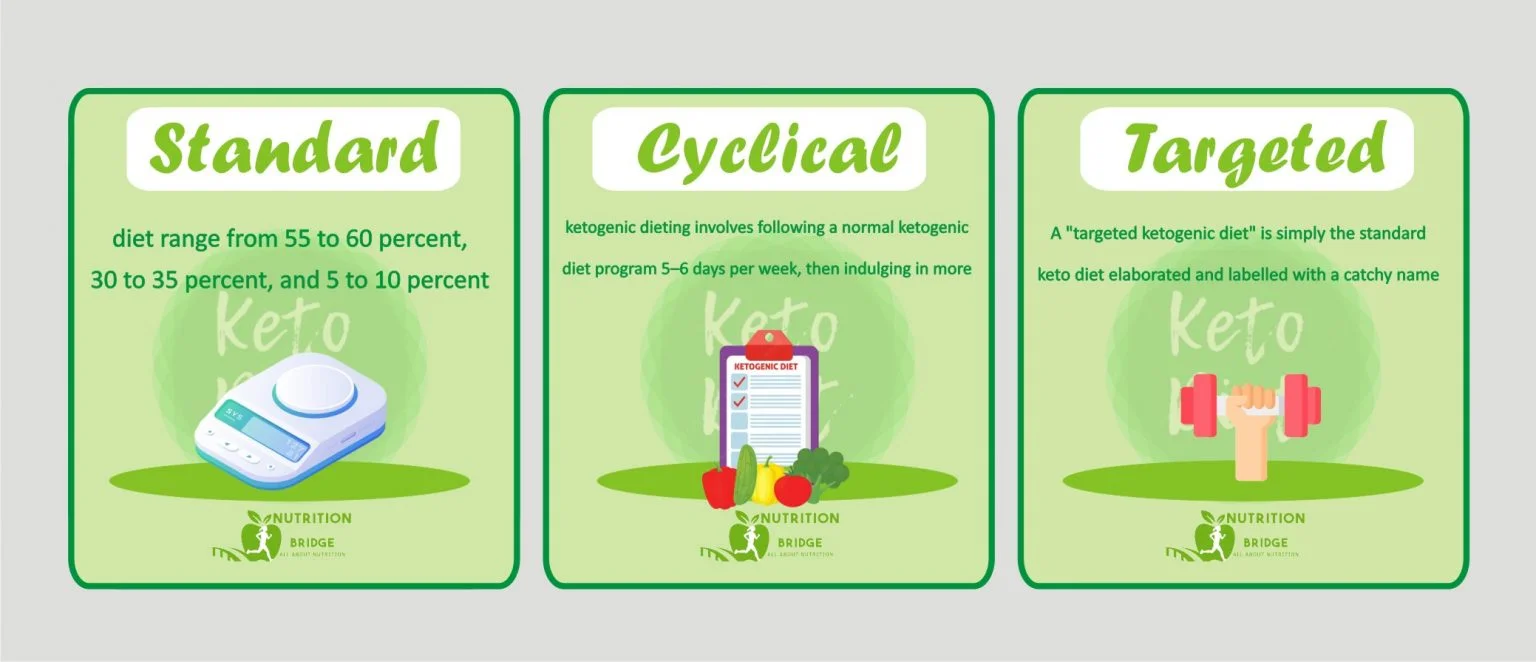
High protein ketogenic diet:
For bodybuilders, a high protein ketogenic diet can be ideal. A diet that is similar to a normal ketogenic diet but includes more protein is known as a high protein ketogenic diet. People following a high protein ketogenic diet can include foods like seeds, fish, eggs, soy, poultry, certain dairy, and non-starchy vegetables in their meals.
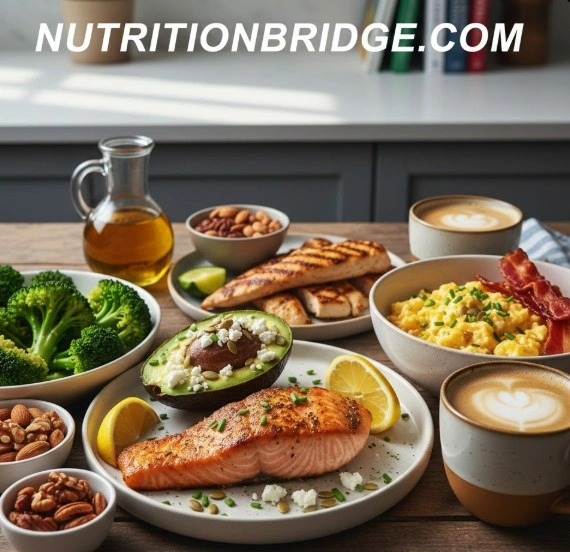
What to Eat on Keto Diet?
“What to eat on keto diet“ is the most asked question from the people who wants to follow this diet. Food you can eat while you are on the keto diet are low-carb foods that are also known as keto-friendly foods.
- You can have various kinds of meat for instance red meat, ham, sausage, bacon, etc.
- Fatty fishes like salmon fish, tuna, trout, etc. can also be a part of your diet.
- Eggs, cheese, nuts, and seeds.
- Dairy products such as cream and butter.
- Avocado and avocado oil both can be consumed.
- Beneficial oils like extra virgin olive oil are a good source of fat in a keto diet.
- Low carbohydrate vegetables are also beneficial during a ketogenic diet. These veggies include Bell peppers, Cucumber, Spanish, Tomatoes, etc.
- Intake of low-carb fruits also plays an important role in this diet. Fruits low in carbohydrates are Pineapple, Strawberry, Watermelon, Raspberry, Peaches, Avocado, Kiwi, etc.
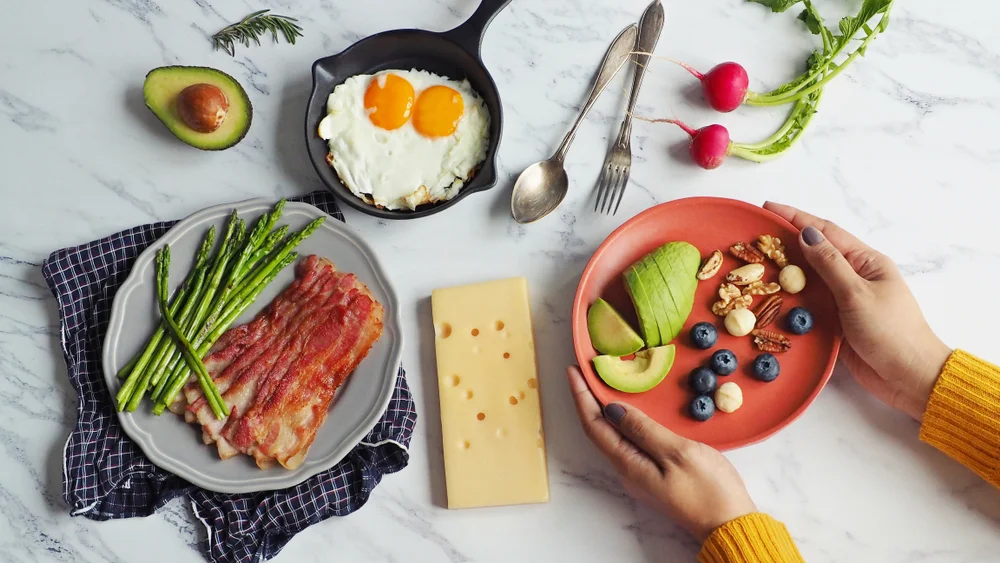
What Not to Eat on Keto Diet?
Foods that we should avoid while on a keto diet are high-carb foods.
- Grains: High-carb foods include crackers, rice, pasta, breadsticks, cereal, and beer. Even the new bean-based portions of pasta and whole-wheat pasta are heavy in carbohydrates.
- Following the ketogenic diet, you should avoid eating too many starchy vegetables because they have more digestible carbohydrates. These include corn, potatoes, and sweet potatoes. Take less high-sugar foods as well because they cause a faster increase in blood sugar.
- Sugary fruits should also be avoided. Those fruits are bananas, Raisins, Dates, Mangoes, and pears.
- Juices, honey, or any source of sugar is not good food in a keto diet.
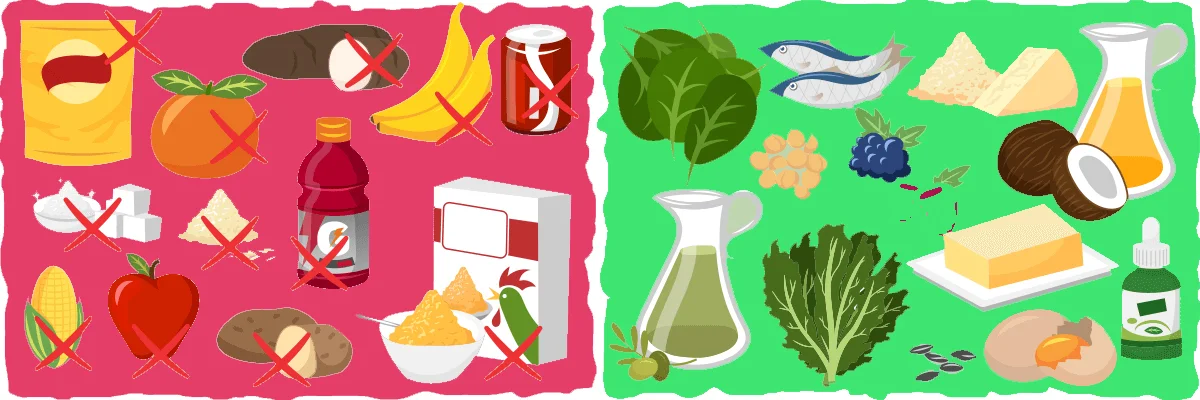
What is Keto Diet plan?
The diet plan that fulfills the requirements for ketosis is the keto diet plan. In the keto diet plan, it is important to balance the nutrients and calories in your diet. The first thing is to restrict the calories. Calories must be taken accurately taking the BMR (Basal Metabolic Rate) into consideration. Calories come from both type of nutrients i.e., micronutrients and macronutrients. The other most important thing is the control diet of nutrients. Micronutrients commonly include vitamins, minerals, calcium, and potassium should be taken into considerate amount. This will help in achieving healthy results for 15-20 days. Macronutrients like proteins, fats, and carbohydrates should be taken into required amounts in the diet. The intake of carbohydrates should be 5-10% (mostly green leafy vegetables). Fat consumption is high in the keto diet i.e., 65-70% in 100g of a meal. Both saturated and unsaturated fats can be taken in this diet. Protein intake should be about 20-25% in a daily meal.
Is there any keto diet plan I can follow?
Yes, as a beginner you can follow a simple keto-friendly daily diet plan. Things that are low in carbs can be consumed. Following is a list of food one can take in different meals of a day:
For Breakfast
- Egg, broccoli, sugar-free coffee, cheese omelet, almonds
- Keto sausage sandwich and black tea
- Egg baked in avocado cup, Nuts
- Keto bread with unsalted butter and blackberry shake
- Coconut cereal or cinnamon cereal
For Lunch
- Salmon fish with lemon squished on it
- Bowl of green salad includes baby tomatoes, olive oil, chicken chunks, etc.
- Greek yogurt with crushed walnuts or cashews on top
- Avocado better-stuffed chicken
- Lettuce wraps
For Dinner
- Rib steak and baked broccoli
- Barbecue Fish and garlic butter
- Spinach Chicken
- Mushroom soup with Chinese beef
- Seasoned shrimps with baked eggplant
Does ketosis make you lose weight?
The answer to the question “Does ketosis make you lose weight?” is yes. Ketosis is a very known way of reducing weight nowadays. Many people are putting themselves on a keto diet because it is a low-carb diet and helps your metabolism in a very positive way. It makes you feel less hungry than before. It helps you lose 500g to 1kg per day if followed appropriately.
Does the keto diet plan affect my muscles?
“Muscle loss on the ketogenic diet is an ongoing area of research,” says Edwina Clark, RD, a dietitian in private practice in San Francisco [1]. There is a possibility for both muscle building and muscle loss according to the health condition of a person. The Keto diet can give muscle strength to a person who is not suffering from any severe disease.
What are the benefits obtained from a Ketogenic Diet?
There are various health benefits of keto diet. It is especially helpful in lowering the body weight and body mass index of a person. There are several benefits we can obtain from a ketogenic diet that is as follow:
What are the Physical Benefits of the keto diet?
- It helps in maintaining your body.
- Loss of weight makes a body more active.
Are there any Medical Benefits of the keto diet?
- It is helpful in treating skin conditions like acne.
- In cancer it uses the already stored sugar in body as a fuel.
- It improves nervous disorder conditions like Alzheimer’s and sleep disorders.
What are the Risks of the Keto Diet?
Although there are many positive results we can have from the keto diet, there is also some risk in following it. It can cause many health issues like indigestion, constipation, flu, tiredness, nausea, nutrient deficiency, etc. The other risks of the keto diet can be as follow:
Is it dangerous to be on keto for a long time?
It can be dangerous for a person suffering from any chronic disease. Deficiency of vitamin and mineral leads to heart diseases. The long-term keto diet can make you lose more than the standard weight which is very unhealthy.
Is there any side effect of the keto diet?
There are numerous side effects of the ketogenic diet. Some of them are mentioned below:
- Deficiency of B Complex:
As the keto diet is a low-carb diet so basically this is the reason for B Complex deficiency as it is obtained from carbohydrates. Because our body needs B Complexes like B1, B2, B3, B6, B7, B12, and biotin.
- Fatigue:
Fatigue is the most common side effect of the keto diet. The energy need of our body is highly fulfilled by the intake of carbohydrates. There is very low consumption of carbs in keto which causes fatigue and tiredness.
- Sleep issues:
Insomnia or other sleep issues are also very common side effects of ketogenesis.
- Low blood sugar level:
Patients having diabetes should take a ketogenic diet as it helps in maintaining the low sugar level. Diabetic patients should control their insulin intake and carbohydrate intake side by side. But for normal people, this is not good.
What are Supplements for a ketogenic diet?
The supplements for a ketogenic diet are as follow:
- Keto Charge: Helps is active ketosis and fast burning of fats.
- Keto Power Boost: Helps in improving the energy level and boost metabolism.
- Keto Elevate: Helps in the production of ketones.
- Omega-3 Fatty Acids: Helps in decrease the insulin level
What are the Useful Tips for the keto diet?
- Water intake is a must while having a keto diet. It helps in reducing the chances of constipation. We can take water in different forms like sugar-free lime soda etc.
- To achieve results keto diet has to be followed regularly. For this purpose, use local ingredients that are convenient to obtain.
- Go to the restaurants that are famous among veg lovers. This will give you a keto-friendly food variety outside the house also.
- Usage of eggs can be high in your diet in various forms like cheese omelets etc.
Summary
- Ketosis starts when there are not many carbohydrates in the body to burn.
- Vitamins, nutrients, and minerals intake must be controlled through the keto diet.
- Low-carb dishes should be eaten every part of the day.
- The deficiencies can be overcome by stopping the keto diet after getting positive results.

